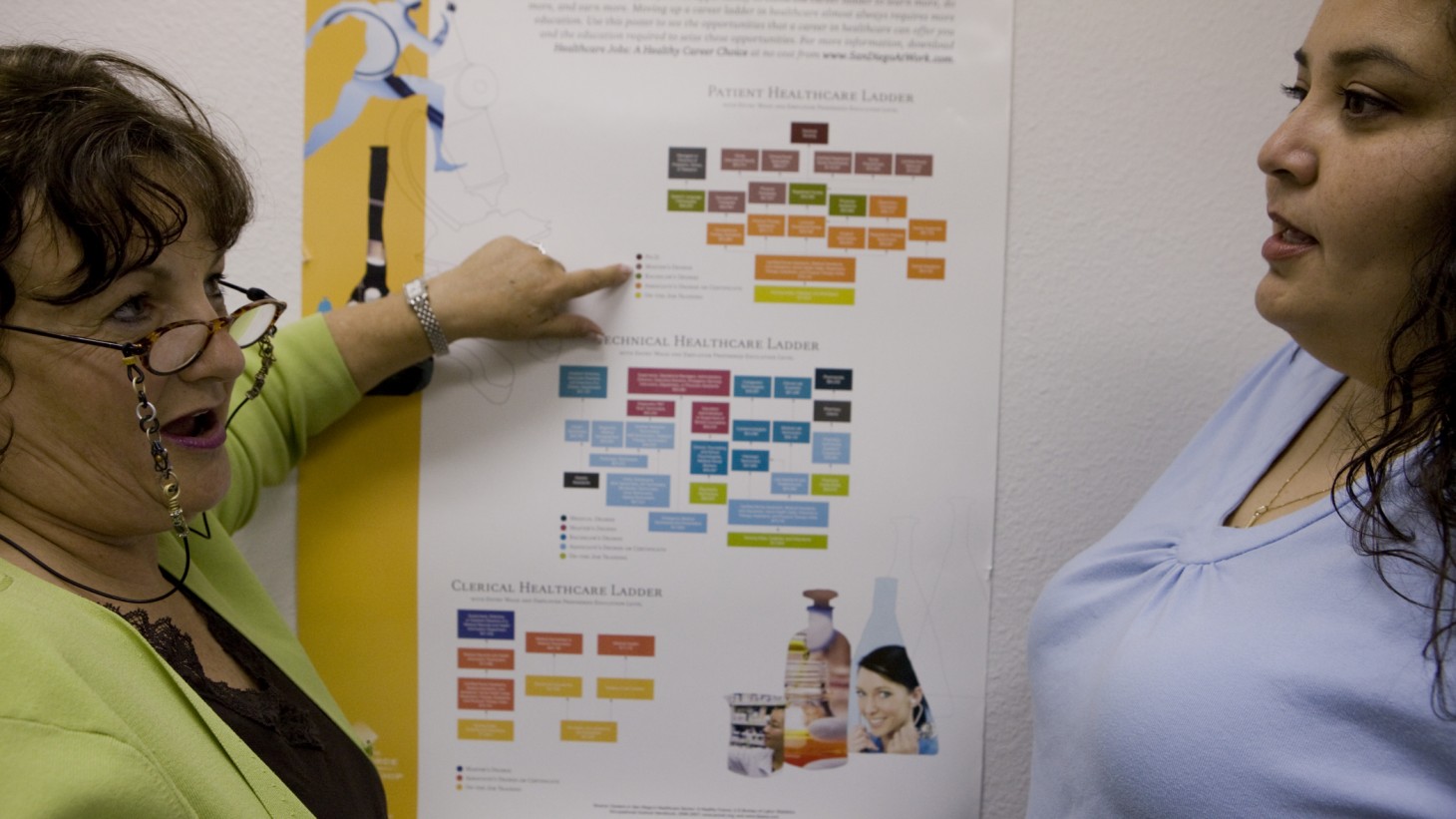Workforce of the Future
Career Counseling Helps With Job Changes

A career counselor works with an employee in San Diego.
New training helps employees find new challenges
Three years ago, when Joann Horton learned her job might be eliminated when HealthConnect™ came online, her first response was fear.
A medical clerk at the Hayward Medical Center in Northern California, Horton needed the income, but she also loved her job. “I was terrified,” she says.
Joyce Lee, an imaging transcriptionist at the Fontana Medical Center in Southern California, found herself in the same boat last year. With KP shifting to a new voice-to-text technology for transcribing radiology results, Lee’s skills were becoming obsolete.
“All of us were figuring out how we were going to do the transition,” she says.
Both of these “changing workplace” stories could have ended badly, especially in today’s shaky economy.
But now, Horton and Lee are fans of the job counseling and retraining provided to partnership union employees through the Employment and Income Security Agreement that allowed them to stay with KP.
Successful retraining
The two women received one-on-one guidance from career counselors who helped them identify and train for in-demand positions.
Horton, who is now the department secretary for Home Health in Hayward, says career counselor Martha Edwards “gave me what I needed to build my skills up, but she also gave me a lot of emotional support.” Edwards works for the Ben Hudnall Memorial Trust, established under the 2005 National Agreement to provide career counseling and job training to members in 12 of the unions that are part of the Labor Management Partnership.
Lee, who now works as a phlebotomist at the Fontana Medical Center in Southern California, also received services through the Ben Hudnall trust. She says counselor Michele DeRosa “has a gift for networking; for figuring out all the pieces of the puzzle, for being the encourager.”
Ongoing outreach
The partnership’s career counseling benefits have benefited thousands of employees in a short amount of time. From its inception in 2007 through March 2011, roughly 10,000 employees had seen career counselors through the Ben Hudnall Trust, with many more attending workshops or promotional events.
The SEIU UHW-West & Joint Employer Education Fund offers similar services to SEIU-represented employees in the Northern California, Southern California, Colorado and Northwest regions. Since 2006, almost 16,000 KP employees have enrolled in training through the program and 6,885 have received counseling and referral services.
Those who have used the programs’ services are enthusiastic proponents; however, ongoing outreach is required, Edwards says, especially since the concept of career counseling is new to many employees.
“I think there’s a lot of mystery around the words ‘career counselor,’ ” she says, “and perhaps some intimidation and confusion.”
Obstacles to career counseling include a fear of being seen as vulnerable or needy, difficulty finding the time for training while working and concern that some managers might not appreciate an employee who is seeking to advance from their current position, Edwards says.
It’s an important part of the counselor’s work to help employees get over these hurdles so the program works best for their needs, she says.
Many employees first learn of the services when facing a major challenge, like Horton and Lee.
However, the programs are designed to offer help in many situations, from employees seeking to change careers to those wanting to gain skills in their field; from those struggling with a manger or co-worker to those struggling with work-family balance.
All services are confidential.
“Our goal is to have something for everyone,” says Lucy Runkel, director of the SEIU UHW fund. “We reach many employees, but we always want more.”
Managers are educational partners
Data from the programs show most employees learn of career counseling through word of mouth. Information also is available at events and online.
Both programs have started boosting educational outreach to managers, whom they view as key allies in spreading the word about the services.
“With a manager, we get more bang for our buck, because they can educate all of their staff,” says Runkel.
Both Kaiser Permanente and its union-represented employees stand to gain, she says. “We think people who are better trained, happier, and have greater longevity on the job are going to provide better care than someone who is new, or unhappy or poorly trained.”
Career counselor Edwards put it this way: “It helps with Kaiser’s ‘best place to work’; seeing employees vital, motivated, moving and growing is a plus for the whole team.”
number of Kaiser Permanente employees, who have enrolled in training since 2006
